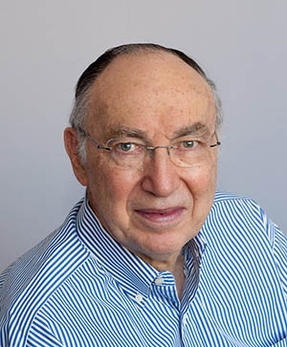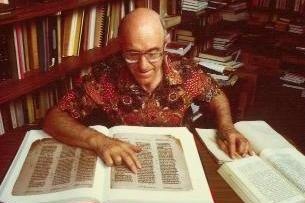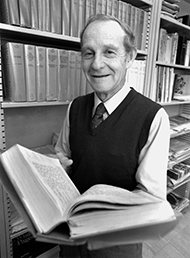Hugh Joseph Schonfield was a British Bible scholar specialising in the New Testament and the early development of the Christian religion and church. He was born and died in London, and educated there at St Paul's School and King's College, doing additional studies in the University of Glasgow. He was one of the founders and president of the pacifist organisation Commonwealth of World Citizens "Mondcivitan Republic".

William Foxwell Albright was an American archaeologist, biblical scholar, philologist, and expert on ceramics. He is considered "one of the twentieth century's most influential American biblical scholars", having become known to the public in 1948 for his role in the authentication of the Dead Sea Scrolls. His scholarly reputation arose as a leading theorist and practitioner of biblical archaeology.

John Gresham Machen was an American Presbyterian New Testament scholar and educator in the early 20th century. He was the Professor of New Testament at Princeton Seminary between 1906 and 1929, and led a revolt against modernist theology at Princeton and formed Westminster Theological Seminary as a more orthodox alternative. As the Northern Presbyterian Church continued to reject conservative attempts to enforce faithfulness to the Westminster Confession, Machen led a small group of conservatives out of the church to form the Orthodox Presbyterian Church. When the Presbyterian Church in the United States of America (PCUSA) rejected his arguments during the mid-1920s and decided to reorganize Princeton Seminary to create a liberal school, Machen took the lead in founding Westminster Seminary in Philadelphia (1929) where he taught New Testament until his death. His continued opposition during the 1930s to liberalism in his denomination's foreign missions agencies led to the creation of a new organization, the Independent Board for Presbyterian Foreign Missions (1933). The trial, conviction and suspension from the ministry of Independent Board members, including Machen, in 1935 and 1936 provided the rationale for the formation in 1936 of the OPC.

Géza Vermes, was a British academic, Biblical scholar, and Judaist of Jewish–Hungarian descent—one who also served as a Roman Catholic priest in his youth—and scholar specialized in the field of the history of religion, particularly ancient Judaism and early Christianity. He is best known for his complete translation of the Dead Sea Scrolls into English; his research focused on the Dead Sea Scrolls and other Ancient Hebrew writings in Aramaic such as the Targumim, and on the life and religion of Jesus. Vermes was one of the most important voices in contemporary Jesus research, and he has been described as the greatest Jesus scholar of his time. Vermes' written work on Jesus focuses principally on the Jewishness of the historical Jesus, as seen in the broader context of the narrative scope of Jewish history and theology, while questioning and challenging the basis of the Christian doctrine on Jesus.

Joseph Augustine Fitzmyer was an American Catholic priest and scholar who taught at several American and British universities. He was a member of the Society of Jesus (Jesuits).

Hershel Shanks was an American lawyer and amateur biblical archaeologist who was the founder and long-time editor of the Biblical Archaeology Review.

John Strugnell was an English Professor Emeritus at the Harvard Divinity School and a former editor-in-chief of the Dead Sea Scrolls project. Strugnell became, at 23, the youngest member of the team of scholars led by Roland de Vaux, formed in 1954 to edit the Dead Sea Scrolls in Jerusalem. He was studying Oriental languages at Jesus College, Oxford when Sir Godfrey Rolles Driver, a lecturer in Semitic philology, nominated him to join the Scrolls editorial team.
The Rule of the Congregation is an appendix to one of the first seven Dead Sea Scrolls discovered in caves near the Qumran site in 1946. Three related sectarian documents were discovered in Qumran Cave 1: The Community Rule (1QS), The Rule of the Congregation (1QSa), and The Rule of the Blessing (1QSb). The Rule of the Congregation and the Rule of the Blessing were initially overlooked by researchers and considered a continuation of the much longer Community Rule.
Daniel 7 tells of Daniel's vision of four world-kingdoms replaced by the kingdom of the saints or "holy ones" of the Most High, which will endure for ever. Four beasts come out of the sea, the Ancient of Days sits in judgment over them, and "one like a son of man" is given eternal kingship. An angelic guide interprets the beasts as kingdoms and kings, the last of whom will make war on the "holy ones" of God, but they will be destroyed and the "holy ones" will be given eternal dominion and power.

Frank Moore Cross Jr. was the Hancock Professor of Hebrew and Other Oriental Languages at Harvard University, notable for his work in the interpretation of the Dead Sea Scrolls, his 1973 magnum opusCanaanite Myth and Hebrew Epic, and his work in Northwest Semitic epigraphy. Many of his essays on the latter topic have since been collected in Leaves from an Epigrapher's Notebook.

Samuel Ifor Enoch was Professor of New Testament Studies and Principal of the Presbyterian United Theological College, Aberystwyth in Wales.
Eugene "Gene" CharlesUlrich is an American Dead Sea scrolls scholar and the John A. O'Brien Professor emeritus of Hebrew Scripture and Theology in the Department of Theology at the University of Notre Dame. He is chief editor of the biblical texts of the Dead Sea scrolls and one of the three general editors of the Scrolls International Publication Project.
Allan Alexander MacRae was an evangelical Christian scholar who, with Harold S. Laird, Carl McIntire, Roland K. Armes, and several other conservative Presbyterians, helped found Faith Theological Seminary and, with Jack Murray, Biblical Theological Seminary. Because of his longevity, MacRae engaged in both the battles of the fundamentalist-modernist controversy and with the rise of Neo-evangelicalism in mid-20th century America, playing important roles in the establishment of three conservative American seminaries.
Chapters 10, 11, and 12 in the Book of Daniel make up Daniel's final vision, describing a series of conflicts between the unnamed "King of the North" and "King of the South" leading to the "time of the end", when Israel will be vindicated and the dead raised, some to everlasting life and some to shame and everlasting contempt.

Francis Ian Andersen was an Australian scholar in the fields of biblical studies and Hebrew. Together with A. Dean Forbes, he pioneered the use of computers for the analysis of biblical Hebrew syntax. He taught Old Testament, History, and Religious Studies at various institutions in Australia and the United States, including Macquarie University, the University of Queensland, and Fuller Theological Seminary. His published works include the Tyndale commentary on Job, and Anchor Bible commentaries on Hosea, Amos, Habakkuk and Micah, and over 90 papers.
Loren T. Stuckenbruck is a historian of early Christianity and Second Temple Judaism, currently professor of New Testament at the University of Munich, in Germany. His work has exerted a significant impact on the field.
William Sanford LaSor was an American academic who worked as a professor emeritus of Old Testament at Fuller Theological Seminary in Pasadena, California.
Millar Burrows was an American biblical scholar, a leading authority on the Dead Sea scrolls and professor emeritus at Yale Divinity School. Burrows was director of American School of Oriental Research in Jerusalem, and later president of the American Schools of Oriental Research. His grandson, Edwin G. Burrows (1943–2018), was an American historian and winner of the Pulitzer Prize (1999). His great-granddaughter, Kate Burrows, is a professor of public health at the University of Chicago.
Peter William Flint was an American biblical scholar who was involved in research of the Dead Sea Scrolls for over 20 years.

Lewis Bayles Paton was an American biblical scholar, archaeologist and historian. He was a professor at the Hartford Theological Seminary for many years, and a well known authority on Old Testament exegesis.










